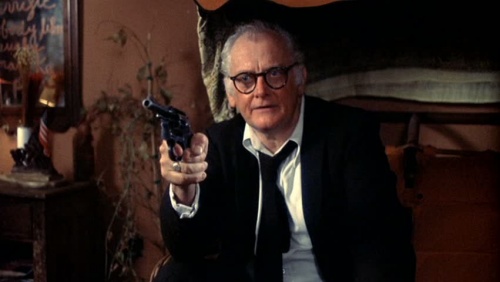The Late Show sports a typically tangled hardboiled plot, and it could have been nothing but a fond, evocative homage to the genre. Instead, writer/director Robert Benton infuses the film with weary heart, giving us a clear-sighted yet affectionate look at his off-kilter, downtrodden protagonists. Ira Wells (Art Carney) is an aging private eye whose life seems to have mostly dwindled down to memories and the small room he rents; Margo Sperling (Lily Tomlin) is past her prime in her own way, as a flower child and one-time actress whose breakout never exactly came. She now does a little low-level pot-dealing and affects a combination of cynicism and New Age philosophy, neither of which entirely deals with her loneliness.
The two of them collide when Ira’s friend and former partner, Harry Regan (Howard Duff), shows up at Ira’s bleeding to death; all he can talk about is some kind of score that he promises to cut Ira in on. Margo, introduced by local information-peddler Charlie Hatter (Bill Macy), uses Regan’s funeral as a poorly-chosen opportunity to try to hire Ira to retrieve her stolen cat. The two are from such different worlds that they bristle up around each other right away, but it doesn’t take long for Ira to realize that Margo’s cat case (previously handled by Regan) is tied into his old partner’s murder. The two of them start working together, and their wildly different priorities gradually coalesce into something heartbreakingly similar: they each want to know they’ve been genuinely useful and that they aren’t yet done leaving their mark on the world. The best scenes of the film involve them quietly enthusing to each other after pulling off some traditional crime movie stunt, and Carney and Tomlin both play their sincere excitement and pleasure beautifully.
Slowly but surely, these two awkwardly find their way into each other’s lives. Believably, Margo is more willing to make an immediate connection; Ira, whose loneliness has been a way of life for a long time, is slower to embrace their friendship as a genuine change rather than a simple diversion. Their relationship is the backbone of the film, and its strength allows Benton to do some mildly off-kilter things with his crime plot, including investing his antagonists with some of the same comic “can they be taken seriously or not?” energy as his protagonists.
This film is often loved but not as widely known as it should be, and it’s well-worth seeking out. It’s currently available streaming on TCM Online.

